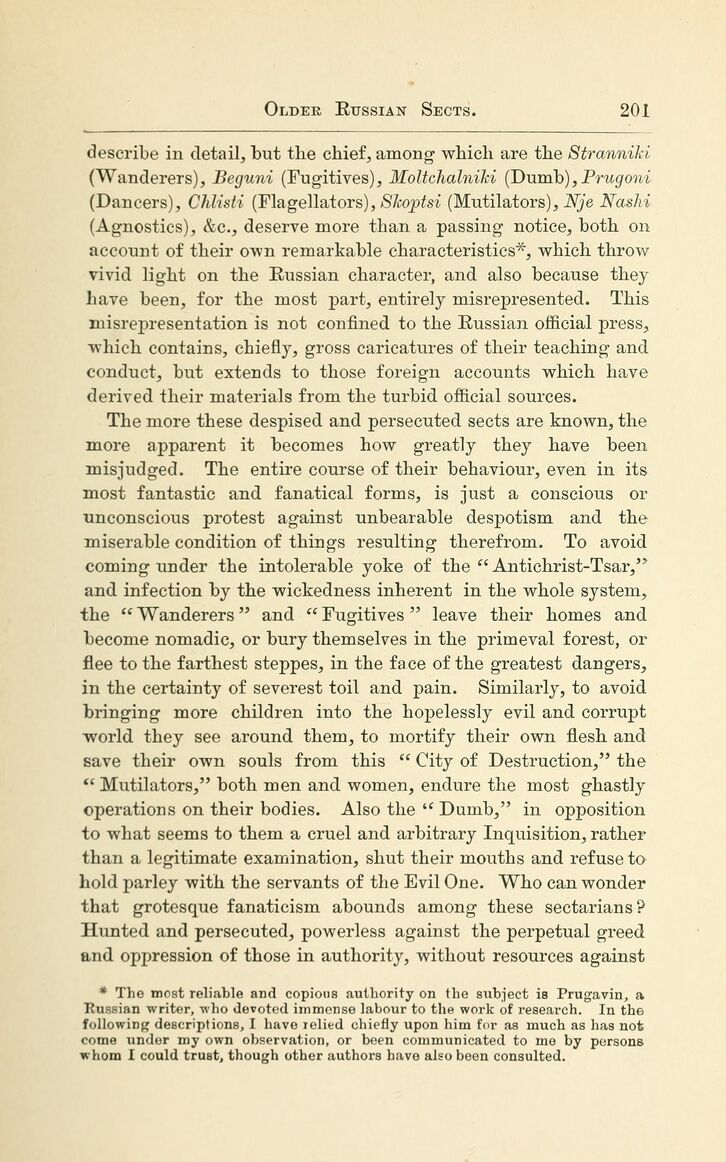
Full resolution (JPEG) - On this page / på denna sida - XIV. Older Russian Sects

<< prev. page << föreg. sida << >> nästa sida >> next page >>
Below is the raw OCR text
from the above scanned image.
Do you see an error? Proofread the page now!
Här nedan syns maskintolkade texten från faksimilbilden ovan.
Ser du något fel? Korrekturläs sidan nu!
This page has been proofread at least once.
(diff)
(history)
Denna sida har korrekturlästs minst en gång.
(skillnad)
(historik)
describe in detail, but the chief, among which are the Stranniki
(Wanderers), Beguni (Fugitives), Moltchalniki (Dumb), Prugoni
(Dancers), Chlisti (Flagellators), Skoptsi (Mutilators), Nje Nashi
(Agnostics), &c., deserve more than a passing notice, both on
account of their own remarkable characteristics[1], which throw
vivid light on the Russian character, and also because they
have been, for the most part, entirely misrepresented. This
misrepresentation is not confined to the Russian official press,
which contains, chiefly, gross caricatures of their teaching and
conduct, but extends to those foreign accounts which have
derived their materials from the turbid official sources.
The more these despised and persecuted sects are known, the
more apparent it becomes how greatly they have been
misjudged. The entire course of their behaviour, even in its
most fantastic and fanatical forms, is just a conscious or
unconscious protest against unbearable despotism and the
miserable condition of things resulting therefrom. To avoid
coming under the intolerable yoke of the “Antichrist-Tsar,”
and infection by the wickedness inherent in the whole system,
the “Wanderers” and “Fugitives” leave their homes and
become nomadic, or bury themselves in the primeval forest, or
flee to the farthest steppes, in the face of the greatest dangers,
in the certainty of severest toil and pain. Similarly, to avoid
bringing more children into the hopelessly evil and corrupt
world they see around them, to mortify their own flesh and
save their own souls from this “City of Destruction,” the
“Mutilators,” both men and women, endure the most ghastly
operations on their bodies. Also the “Dumb,” in opposition
to what seems to them a cruel and arbitrary Inquisition, rather
than a legitimate examination, shut their mouths and refuse to
hold parley with the servants of the Evil One. Who can wonder
that grotesque fanaticism abounds among these sectarians?
Hunted and persecuted, powerless against the perpetual greed
and oppression of those in authority, without resources against
<< prev. page << föreg. sida << >> nästa sida >> next page >>